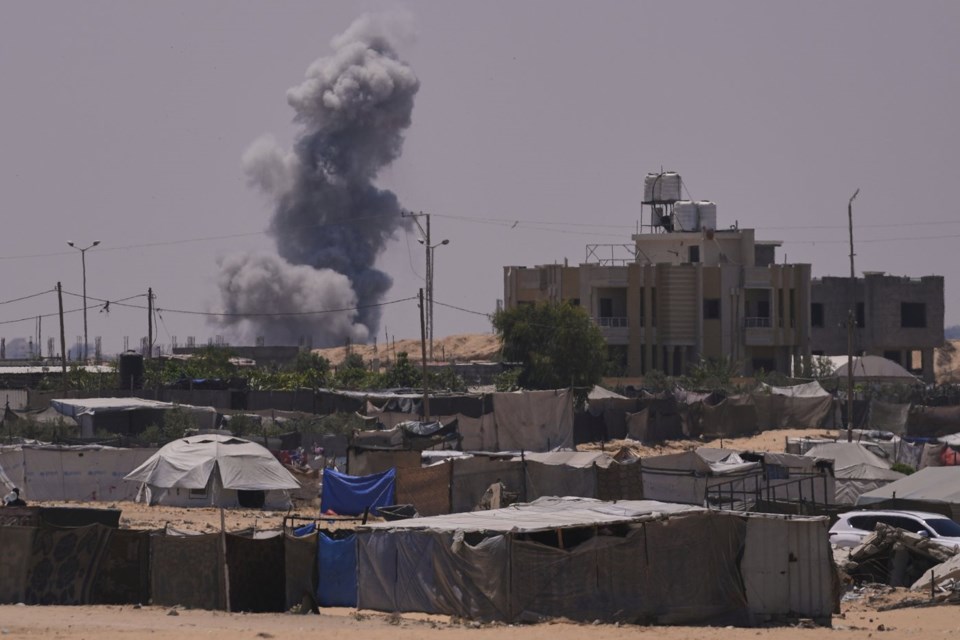OTTAWA — A Palestinian student accepted by the University of Alberta is now preparing to continue his studies in France because he says that country was able to get him out of Gaza to safety — and Canada wasn't.
Ehab is one of about 70 students from Gaza pursuing study opportunities abroad with the help of the Canadian-based Palestinian Students and Scholars at Risk Network.
Ehab said he applied for his Canadian student visa in February. The Canadian Press has agreed not to publish his last name due to security concerns.
Documents shared with The Canadian Press show that Ehab was accepted to the University of Alberta's mechanical engineering masters program in March, and his visa application was received by the Canadian government in April.
He said he is aware of other Palestinian students who have been waiting for more than a year for their Canadian visas. He applied for a scholarship in France as well and was accepted into Centrale Méditerranée in June.
"After that, the government connected me with the embassy to do the procedure for evacuation from Gaza Strip and to get the visa," Ehab said.
Within days of submitting his French visa application, Ehab said, Paris helped facilitate his exit from Gaza and his travel to the French embassy in Jordan, where he could submit the necessary biometrics — identifiers like fingerprints — for his visa application.
His approved French student visa document is dated July 10.
Ehab is now in Marseille, where he expects to begin a master's program in biomedical engineering this September.
He said he believes the French government made his evacuation work because he and other Palestinian students bound for France are studying to be engineers and doctors.
Ayman Oweida, chair of the Palestinian Students and Scholars at Risk Network, said that Ehab is one of five students the organization's been working with who have enrolled in French schools in recent weeks.
He said it's "baffling" that France has been able to get students out of Gaza and approve their visas so much faster than Canada.
"It continues to baffle us as to what is going on here that the Canadian government is not doing right, if it's doing anything, honestly. And that's what we think. It's not doing anything about the situation," Oweida said.
An emailed response from Rémi Larivière, an Immigration Refugees and Citizenship Canada spokesperson, said many "complex factors" affect the processing of visa applications from the region.
"Each country sets its own entry and exit requirements. We continue working closely with local authorities — at every level — to advocate for the exit of people in Gaza, however we do not ultimately decide who can leave," Larivière said.
The spokesperson added that anyone coming to Canada from Gaza must undergo additional security screening in addition to standard biometrics.
"As security screenings are conducted by agencies outside of IRCC, we are unable to provide average processing time," Larivière said.
Canada does not have a consular or diplomatic presence in Gaza, so biometrics can only be collected outside the territory.
French President Emmanuel Macron spoke of wanting to recognize a Palestinian state as part of a ceasefire deal as recently as June.
With comments like this coming from the French government, Oweida said, it's surprising that France has succeeded in getting students out of Gaza while Canada has not.
"I think it says volumes, even though we don't really understand what is going on at the level of the Canadian government, but the observations that we're seeing speak volumes and of themselves," he said.
"How could France, who's been quite critical of Israel, evacuate?"
A French government website says that France does accept Palestinian visa applications in Jerusalem and Ramallah, a city in the West Bank. Before the war, France was able to accept visa applications in Gaza.
Oweida said he's had to defer the enrolment of a Palestinian graduate student three times now. She's been stuck in Gaza for over a year, unable to advance her visa application, he said.
Oweida said that as the war continues and food insecurity pushes Gaza toward famine, he and other Canadian academics may have to look for international partners to get students enrolled elsewhere.
"At the end of the day, it's the student's safety that we want to ensure," he said.
While Ehab prepares to continue his studies in France, he said he would still like to come to Canada and pursue his degree at the University of Alberta someday. It's an opportunity he said he hopes can be extended to his friends still living in a war zone.
"All of my friends in Gaza that get the opportunity of Canada (are) feeling very stressed and very strained and it's very dangerous," he said.
"I hope for my loving country, Canada. I hope, for IRCC … if they help my friends to complete our dreams and don't miss this."
This report by The Canadian Press was first published July 21, 2025.
David Baxter, The Canadian Press



